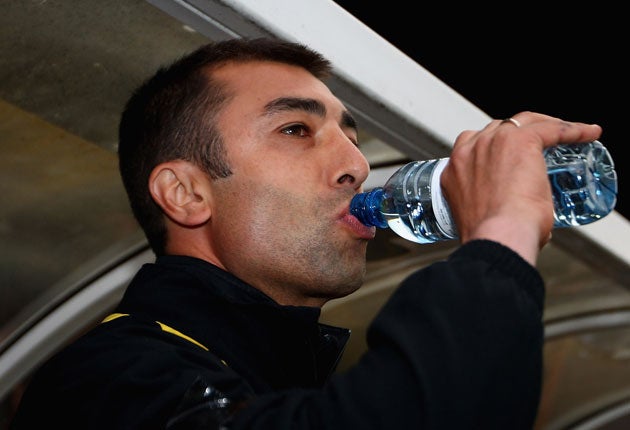Your support helps us to tell the story
From reproductive rights to climate change to Big Tech, The Independent is on the ground when the story is developing. Whether it's investigating the financials of Elon Musk's pro-Trump PAC or producing our latest documentary, 'The A Word', which shines a light on the American women fighting for reproductive rights, we know how important it is to parse out the facts from the messaging.
At such a critical moment in US history, we need reporters on the ground. Your donation allows us to keep sending journalists to speak to both sides of the story.
The Independent is trusted by Americans across the entire political spectrum. And unlike many other quality news outlets, we choose not to lock Americans out of our reporting and analysis with paywalls. We believe quality journalism should be available to everyone, paid for by those who can afford it.
Your support makes all the difference.Michael Appleton began work as the caretaker manager of West Bromwich Albion yesterday – with the possibility growing that he will lead the Premier League strugglers into two critical home games, either as Roberto Di Matteo's successor or as the coach to the current St Johnstone manager Derek McInnes.
Appleton was the first-team coach during Di Matteo's 19-month reign at The Hawthorns, which ended in dismissal on Sunday morning after Saturday's 3-0 defeat at Manchester City left his team above the relegation zone only on goal difference. Albion, who receive companions-in-distress West Ham and Wolves over the next two weekends, dispensed with Di Matteo's No 2, Eddie Newton. However, they retained the 35-year-old Appleton, who has been on the staff for eight years since injury forced his retirement as a player, and may be tempted to reunite him with former team-mate McInnes.
Sam Allardyce last night ruled himself out of the running, which will include other recently sacked managers such as Roy Hodgson, Chris Hughton and now Steve McClaren. But the Albion chairman, Jeremy Peace, is keen to adhere to the structure within which the manager – or head coach as Albion bill him – works to a blueprint established by the sporting and technical director Dan Ashworth.
Appleton is steeped in Ashworth's methodology, which includes being responsible for identifying and signing players within Albion's modest budget. The club, in turn, want to keep him on board as someone who could provide continuity of the progressive style that helped Albion win promotion last season and saw them briefly break into the top four in September.
The former Manchester United reserve may yet be promoted from within, but if Albion decide their position is too parlous to trust to someone without managerial experience, he could work alongside McInnes, a former club captain. The pair are close friends, having combined in Albion's midfield. McInnes, now 39, was captain of Gary Megson's side that reached the top flight in 2002. The twice-capped Scotland international left after their relegation 12 months later and in 2007 became the manager of St Johnstone when Owen Coyle was head-hunted by Burnley.
McInnes enhanced his reputation in 2009 after leading the Perth side back into the Scottish Premier League after a seven-year absence. Having finished a respectable eighth last season, St Johnstone are again holding their own, making their manager a target for Watford two summers ago and Burnley when they dispensed with Coyle's successor Brian Laws in December.
Ron Atkinson, who had two spells as Albion manager, yesterday urged the club to go for Sam Allardyce, only for the former Blackburn, Bolton and Newcastle manager to confirm last night that he would not be applying. It would have been difficult anyway to envisage Allardyce answering to Ashworth, who had a short, unsuccessful playing career with Norwich.
The same caveat is likely to apply to Martin O'Neill and possibly Hodgson, experienced managers who like to have control. Moreover, whoever succeeds Di Matteo will have to work with the very particular kind of players he and Ashworth recruited, few of whom would appear to suit a robust game.
Di Matteo is believed to have wanted to sign a striker and a centre-back in the transfer window yet ended up with neither – a sign, perhaps, that Peace had lost faith in him. The biggest surprise was the timing. It means that the Italian's successor, whose sole aim is survival, must achieve it with a squad who have lost 13 of their last 18 fixtures.

Join our commenting forum
Join thought-provoking conversations, follow other Independent readers and see their replies
Comments